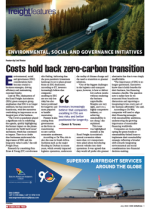Who needs fossil fuels when you have seaweed? A Cape Town-headquartered company is making headlines for its innovative mission to neutralise emissions in the shipping industry by producing bio-LNG (liquefied natural gas) and e-methanol from seaweed.According to Johannes Bochdalofsky, founder of SeaH4, the concept has been in development for several years but has gained significant momentum over the past four years, becoming more financially viable.Speaking to Freight News, he said that interest in developing fuel from seaweed was growing within the maritime sector in particular. The company has been collaborating closely with an international shipping line, as well as the South African Department of Transport and the International Maritime Organization (IMO). The IMO commissioned GreenFuelHub (GFH) to independently evaluate the greenhouse gas emissions savings potential of SeaH4's liquefied biomethane (LBM) and e-methanol production.This evaluation covered all stages of the production chain, from algae cultivation to final fuel synthesis. The products have undergone pre-audits for certification under the International Sustainable Carbon Certification (ISCC) European Union standards, indicating strong compliance and readiness for the market.Test facility"We are currently in the process of building our test facility in Pepper Bay in Saldanha," said Bochdalofsky. He explained that the seaweed used was not sourced from the sea but rather grown on non-arable land near the coastline in small man-made ponds."South Africa already has an established seaweed-growing industry, thanks to its abalone farms. We have the know-how; now it's about scaling up significantly," he added. "None of the seaweed used is imported or genetically modified, and we have no impact whatsoever on the indigenous biotome.”Plans are already under way to construct a pilot plant, with construction slated to begin next year. Bochdalofsky anticipates having a full-scale facility operational by as early as 2028.Explaining the process further, he said seaweed was transformed into a biogas, which in turn was upgraded into bio-LNG and even liquified e-methanol with the final emergence of green hydrogen.Maritime industry prioritised"We are confident in our ability to produce LBM and e-methanol at scale, which is why we have prioritised the maritime industry over road transport. At this stage, it is easier and more profitable to produce bio-LNG and e-methanol than e-diesel," said Bochdalofsky.However, the company does have plans to expand its product range in the long term to include e-diesel. "We view Africa as an ideal market and believe our products can contribute to delivering carbon-neutral fuels across the continent. Electrification of road transport in Africa is not expected to happen soon, and the affordability of purchasing new vehicles makes our product highly viable," he continued. "We continue to focus on the maritime industry because our core team has a background in this sector, and we believe the current business case is particularly attractive.”He said SeaH4 was also exploring the production of compressed gas for use in tugboats and near-shore fishing vessels. "We are already in discussions with a port authority in Africa to develop a solution where compressed natural gas can be used in tugs as old as 40 years.”He described the solution as involving the installation of a dual-fuel kit on the existing engine of the tug, with compressed gas cylinders strapped to the wheelhouse. "This approach allows us to decarbonise even older vessels," he said. According to Bochdalofsky, while it took time for the entire concept to get off the ground, this delay has been beneficial. "With the growing focus on sustainability over the past four years, we have seen a dramatic change in perception around our product," he said. "Initially, we were planning for a commercial facility capable of producing around 15 000 tons of LBM per year, along with the equivalent amount of e-methanol. However, shipping lines have indicated they would require at least four times that amount."Scaling upHe explained that the company had initially kept its production calculations conservative to ensure financial feasibility. However, with the emergence of alternative fuels at much higher prices, the possibility of scaling up to higher quantities of production has now become a reality.“We have a very solid case study, and our product competes on par with the best in the world.

